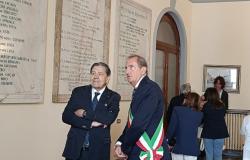L’Oréal Italia today announced the six winners of the XXII Italian edition of the Young Talents Italia Award – L’Oréal Italia Unesco for Women and Science. The Minister for University and Research Anna Maria Bernini and the Minister for Family, Birth and Equal Opportunities Eugenia Maria Roccella also spoke during the ceremony with a video message.
In Italy, from 2002 to 2023, the “L’Oréal Italia per le Donne e la Scienza” program awarded 6 scholarships worth 20,000 euros each year for a total of 112 scholarships. Starting from this XXII Italian edition, in agreement with the jury, the scholarships have become real awards with the aim of involving a larger number of researchers and having greater compatibility with other scholarships that the candidates they could get.
An opening that wants to once again give a strong signal: concrete support for young researchers who will be able, thanks to the Award, to carry on their research activity and study project in Italy. This edition’s call received 260 applications.
the six awarded researchers and their research projects
The jury, composed of a panel of illustrious Italian university professors and scientific experts and chaired by Professor Lucia Votano, Research Director affiliated with the National Institute of Nuclear Physics, after careful evaluation, selected the six most deserving researchers for their projects.
Bernadette Basilico
Bernadette is a neurobiologist with a PhD in neuroscience. Her research focuses on particular conditions that affect the nervous system, so that new therapeutic targets can be identified for the treatment of neurological and neuroinflammatory pathologies.
Project – Study of patient-specific mechanisms in the pathology related to the SYNGAP1 mutation to develop targeted therapeutic strategies.
Host Institute – Sapienza University of Rome, Department of Physiology and Pharmacology “Vittorio Erspamer”.
Giada Peron
Giada is an astrophysicist specialized in high energies. In particular, his research is dedicated to the gamma band observation of Galactic objects such as supernova remnants, molecular clouds and star clusters.
Project – The contribution of star clusters to Galactic cosmic rays.
Host Institute – INAF (National Institute of Astrophysics) – Arcetri Astrophysical Observatory.
Veronica Nava
Veronica is an ecologist specializing in the study and management of freshwater environments. Her research focuses in particular on anthropogenic impacts on lakes and rivers, through the analysis of long-term data and experimental studies.
Project – Impact of plastic pollution on the metabolism and functioning of lake ecosystems.
Host Institute – University of Milan-Bicocca, Department of Environmental and Earth Sciences.
Federica Fabbri
Federica is a physicist, specialized in the study of sub-nuclear phenomena. She works on applying concepts from quantum information theory to the study of elementary particles produced at very high energy in particle accelerators.
Project – Exploring quantum observables at LHC.
Host Institute – University of Bologna “Alma Mater Studiorum”, Department of Physics and Astronomy “Augusto Righi”.
Anna Corti
Anna Corti, biomedical engineer and researcher, specializes in the development of predictive models of cardiovascular risk based on the integration – through artificial intelligence techniques – of elements of computational biomechanics and methods of advanced analysis of medical images.
Project – PRISM – Predicting high-Risk carotId plaqueS: a radioMechanical profiling. Prediction of vulnerable carotid plaques: the synergistic approach of radiomics and biomechanics.
Host Institute – Polytechnic of Milan, Department of Electronics, Information and Bioengineering.
Chiara Trovatello
Chiara is an experimental physicist specialized in studying the optical properties of two-dimensional materials, similar to graphene. His research concerns the field of photonics, and in particular lasers, and uses ultrafast spectroscopy and nonlinear optics techniques to explore these new materials, which are revolutionizing the world of opto-electronics and quantum communications.
Project – Quantum entanglement with low-dimensional semiconductor materials.
Host Institute – Polytechnic of Milan, Department of Physics.
The L’Oréal-Unesco “For Women in Science” program began internationally in 1998 and has since been committed to enabling more and more female scientists to overcome barriers to career advancement and help solve major challenges of our times, for the benefit of all. Over 26 years, the program has supported more than 4,100 female researchers from over 110 countries, rewarding scientific excellence and inspiring generations of young women to pursue their careers. Seven of these scientists, after winning the L’Oréal-UNESCO prize, were awarded the Nobel Prize: among them Emmanuelle Charpentier and Jennifer Doudna, winners of the Nobel Prize for Chemistry in 2020 and Anne L’Huiller and Katalin Karikò winners of the Nobel for Physics and Medicine in 2023.
Ninell Sobiecka, President and CEO of L’Oréal Italia, comments: “For years, thanks to the L’Oréal Foundation, we have been supporting women and promoting their empowerment with various initiatives so that they can shape their future and make a difference within of society. I am very happy today to reward these 6 young and brilliant Italian researchers who will be able, thanks to this important recognition, not only to carry forward their ambitious projects, contributing to the scientific progress of our country but also to be an example for as many future scientists, encouraging them to undertake careers in the STEM field because never before have we believed that the world needs science and science needs women.”
“Supporting the presence of women in the world of STEM subjects is important for the development of the country, from a perspective of gender equality and female empowerment. This is why the ‘L’Oréal Italia per le Donne e la Scienza’ award is so significant: for years it has shown positive role models, talks about the opportunities that the world of research offers, encouraging young women to explore these fields with curiosity and confidence in their skills and breaking down gender stereotypes. An objective that I pursue, for example, in the Mentorship Milan project with which we have already involved over 550 young girls and for which registration for the second edition is already open”, declared Alessia Cappello, Councilor for Economic Development and Labor Policies of the Municipality from Milan.
According to the latest data released by AlmaLaurea and processed by Valore D, there is still a strong gender gap in the study of STEM disciplines which is difficult to overcome.
Analyzing the study of disciplines in the STEM field, we note how female participation is under-represented in engineering and IT faculties while there is an over-representation in university faculties related to training and education, the linguistic and psychological fields. In particular, in the Computer Science and ICT Technologies sector, in 2022 only 17% of students were female.
If, however, we look at the gender composition of university professors and researchers in the various scientific fields, globally, we observe a 6.1% increase in women among full professors from 2012 to 2022, a percentage which increases to 7.4% for associate professors.
Ten years later, we notice an increase in women belonging to the qualification of full professors, associate professors and researchers in all areas. In particular, in mathematical and computer sciences from 2012 to 2022 the increase was +3.2%, while in physical sciences it was +5.9%, in chemical subjects it was +15.4%, in biological sciences it was +5.9%. 7.6%. From what emerges from the latest ANVUR report with focus on the gender gap published in January 2024 and concerning the year 2023, the directors of state universities went from 19.4% in 2012 to 27.9% in 2022, confirming a positive trend of the female presence.




